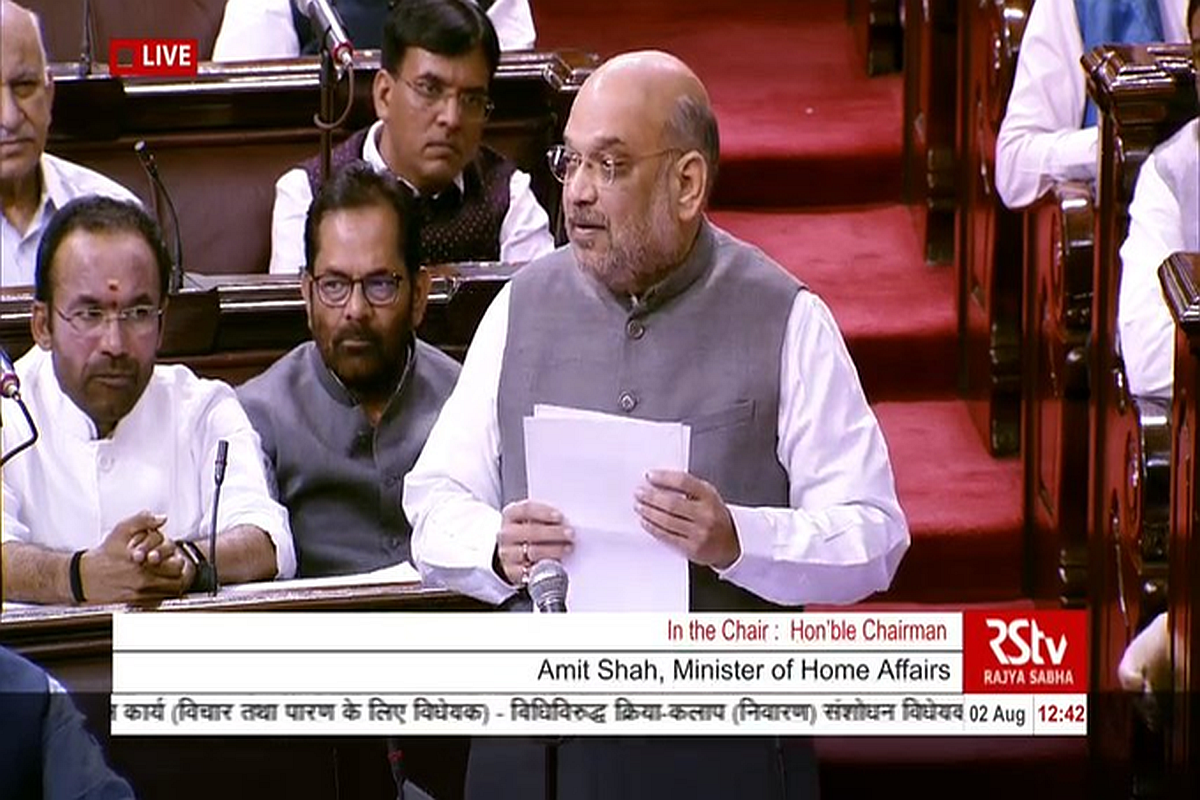The anti-terror Unlawful Activities Prevention (Amendment) Act (UAPA) Bill, 2019 seeking to designate individuals suspected to have terror links as “terrorists”, was passed in the Rajya Sabha on Friday.
The anti-terror bill was passed with 147 votes in its favour and 42 against it in the Upper House of the Parliament.
Advertisement
The contentious bill was passed in the Lok Sabha with 284 votes in its favour and eight against it after the opposition walked out in protest on July 24.
“Terrorism has no religion, terrorists are against humanity; all should support stringent laws against it,” Home Minister Amit Shah said before voting on the bill began on Friday.
Shah said that when the BJP was the opposition, it had supported the previous UAPA amendments asserting that all should support tough measures against terror.
“We believe that terror has no religion, it is against humanity and not against a particular Government or individual,” he said.
The opposition has objected to the amendment bill saying the law could be misused to target individuals.
Congress leader P Chidambaram said that the party was not opposing the Unlawful Activities (Prevention) Act Bill but the idea of Centre being “empowered to add or remove an individual’s name as a terrorist”.
He further said that “it was not the freedom of the organisation that he was talking about but it is the liberty of the individual”.
“Tell us who you have in mind to name. If the first name turns out to be a name because of case and conviction, but if you name someone only because you believe they are involved in terrorism that day you will not be able to sleep,” the former finance m9inister concluded.
He also brought forth the issue of the anti-terror hub National Counter Terrorism Centre (NCTC) and the National Intelligence Grid (NATGRID) saying that if the BJP government wanted to effectively counter terrorism they would implement these initiatives.
To the remarks, Amit Shah replied that counter-terrorism can only be carried out effectively if individuals linked to these organisations are punished.
Shah also invoked the Emergency period when all media was banned and opposition leaders were jailed.
“There was no democracy for 19 months, and you are accusing us of misusing laws? Kindly look at your past,” the Home Minister retorted.
Senior Congress leader Digvijaya Singh slammed the BJP saying that the opposition doubts the Centre’s intent in passing the bill.
“Congress never compromised on terrorism that is why we had brought this law. It is you who compromised on terror, once during the release of Rubaiya Saeed ji and second by letting off Masood Azhar,” he said.
Reacting to Singh’s remarks, Amit Shah said that in the earlier cases, political vendetta prevailed and attempts were made to link a particular religion to terror, adding that “terrorism has no religion”.
Further defending the UAPA Bill, Shah questioned, “US, Pakistan, China and UN all designate an individual as a terrorist, then what are we afraid of?”
The PDP had also objected to the bill saying that such a bill will affect the people of Jammu and Kashmir the most while citing the cases of the wrongful imprisonment of Mohammed Ali and Latif Ahmed who after spending 23 years in jail were let go off after being declared innocent.
RJP MP Manoj Jha termed the provisions in the UAPA bill as “draconian” saying the bill essentially panders to an ideology that conflates nation with the government.
He expressed fear that if someone criticises the government, then he will be called an “anti-national”.
CPI(M)’s Elamaram Kareem in his argument against the bill said that the amendments will lead to large-scale harassment. He also cited the previous POTA and TADA laws under which, he stated that thousands of Muslims were arrested.
Meanwhile, the BSP taking a soft stand on the bill, requested the Government’s assurance that it will not be misused.
Earlier last week, during the debate in Lok Sabha, Amit Shah had said that amendments to UAPA will keep anti-terror agencies two steps ahead of terrorists.
Read | Lok Sabha passes bill that allows Govt to designate individuals with terror links as ‘terrorists’
The Opposition, including the Congress, had demanded that the bill be sent to a Standing Committee for further discussion and scrutiny.









